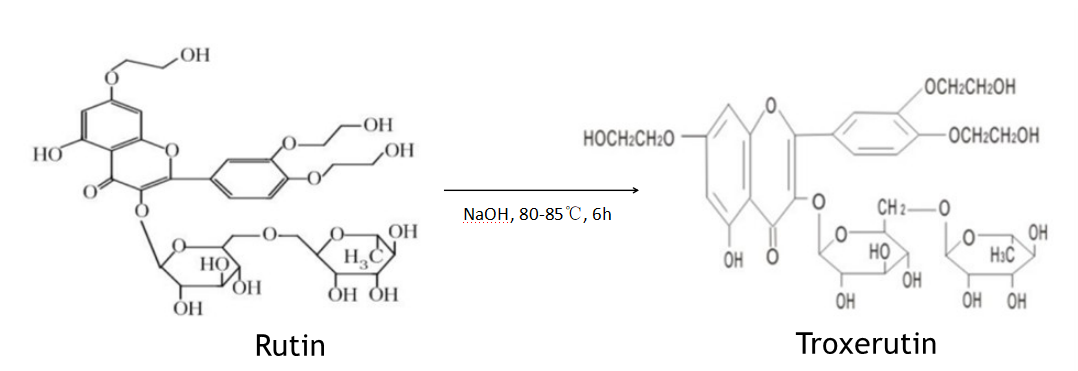Sophora japonica bud contains some potent flavonoids like rutin, which can be also found in many plants, including buckwheat, the leaves and petioles of raspberries, and the bark of horse chestnuts. Troxerutin and Rutin are similar compounds, and both of them have strong antioxidant functions, immunomodulatory and anti-inflammatory properties. They are widely used in cosmetics, functional foods & water-soluble beverages, drug and health supplements compatibility with vitamin C to enhance the absorption of vitamin C. But they are not the same. Both compounds have been used as a supplement, but in different ways and forms.
Rutin (Also referred as vitamin P) is a bioactive polyphenolic flavonol composed of quercetin, glucose and rhamnose. Rutin is a natural antioxidant found in a variety of Chinese medicine herbs, fruits and vegetables consumed daily. Rutin has anti-myocardial damage, anti-inflammation, anti-oxidation, antibacterial, antiviral, anti-tumor and other effects, and its pharmacological activities mainly depend on the antioxidant capacity of rutin.
Compounds obtained from natural products have been found to have fewer side effects. Although rutin has therapeutic effects on many diseases, its poor water solubility and low bioavailability limit its clinical application. Therefore, the structure of rutin has been optimized and modified, including adding a sugar molecule to rutin, which changes its chemical properties, the formation of ether and ester by p-hydroxyl modification, and the substitution of carbonyl oxygen by carbonyl modification. The synthetic method of troxerutin is said to be patented by several pharmaceutical companies. That is, rutin is dissolved in NaOH solution, slowly into ethylene oxide, temperature to 80 ~ 85℃, heat preservation reaction for 6h, and then recrystallized with ethanol to obtain troxerutin products.
In a word, Troxerutin is a hydroxyethylrutoside derivative of rutin in a half-synthetic process, It’s a type of most stable flavonoid from Sophora japonica bud extracts. They have been found to have anti-inflammatory and antioxidant effects used as a dietary supplements. While both have a similar activity but the dosage and usage could vary based on the product, and it should be used as per the physician advice.
You can buy rutin supplements in stores that specialize in dietary supplements or online. They can be used to treat varicose veins and spider veins during pregnancy. The benefits of these substances include their ability to help maintain blood vessel resistance, and improve blood flow, inhibit the formation of blood clots and inhibit the migration of cancer cells, including pancreatic, liver, and lung cancers. Taking them can help prevent these blood clots from forming, which is important for people who are at risk for heart disease or high blood pressure. They are safe for most adults, but there are some side effects to be aware of.
Rutin and troxerutin may interact with medications you are already taking. In particular, you should not take rutin with iron. Also, rutin can cause your blood sugar levels to drop too low, which could lead to hypoglycemia. Do not take them if you are pregnant or nursing, have a history of kidney failure, or are taking medication for diabetes or depression. It is important to note that both compounds are not FDA-approved, so you should talk to your doctor before using them. A good rule of thumb is to avoid them if you have any allergies, asthma, or other medical conditions.
- Dandelion Extract: What It Is, Benefits, Uses and Side Effect - April 23, 2024
- Is Berberine Extract Help For Weight Loss? - April 11, 2024
- Why Is Pysllium Husk Powder A Popular Meal Replacement Ingredient? - April 3, 2024



